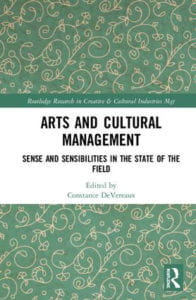A new book, “Arts and Cultural Management: Sense and Sensibilities in the State of the Field“, edited by Dr Constance DeVeraux was published in Spring 2018 by Routledge in their Research in Creative and Cultural Industries Management series.
Dr DeVeraux’s book opens a conversation that is much needed for anyone identifying arts management or cultural management as primary areas of research, teaching, or practice. In the evolution of any field arises the need for scrutiny, reflection, and critique, as well as to display the advancements and diversity in approaches and thinking that contribute to a discipline’s forward progression. While no one volume could encompass all that a discipline is or should be, a representational snapshot serves as a valuable benchmark.

Routledge
ISBN: 9781138048447
One of the contributors in the book is Dr Aleksandar Brkić, Arts Management and Cultural Policy Lecturer from ICCE, with the Chapter “Death of the Arts Manager”. His Chapter reflects on some of the major ontological questions of arts management as an academic discipline and a profession, using the imagined event of death as a model for confrontation, provocation and critical reflection. One of the questions is relating to the confrontational character of the notions of arts and management and the difficulties in bringing the ideas of management and systems into a framework of the arts where too often there is a need to be unflappable and chaotic, free of structures. Second issue is connected with the relations to power within the field of art, and the dilemmas arts management has concerning the positioning relating to sources of power. Third issue discussed is the relation between art management and authorship and legacy – is there a space and need for arts managers to be creative contributors and co-authors in the process of art production? What is the legacy of an arts manager compared to the legacy of an artist? And finally, article is addressing the questioning of the need for formal education of arts managers in the context of society of post 2010’s. Chapter introduces the concept of Return on Meaning (ROM) and suggest an alternative view for the arts management, as a shared set of functions within the process of art production, rather than the individual position of power, compared to the role curators take today in the system of visual arts.